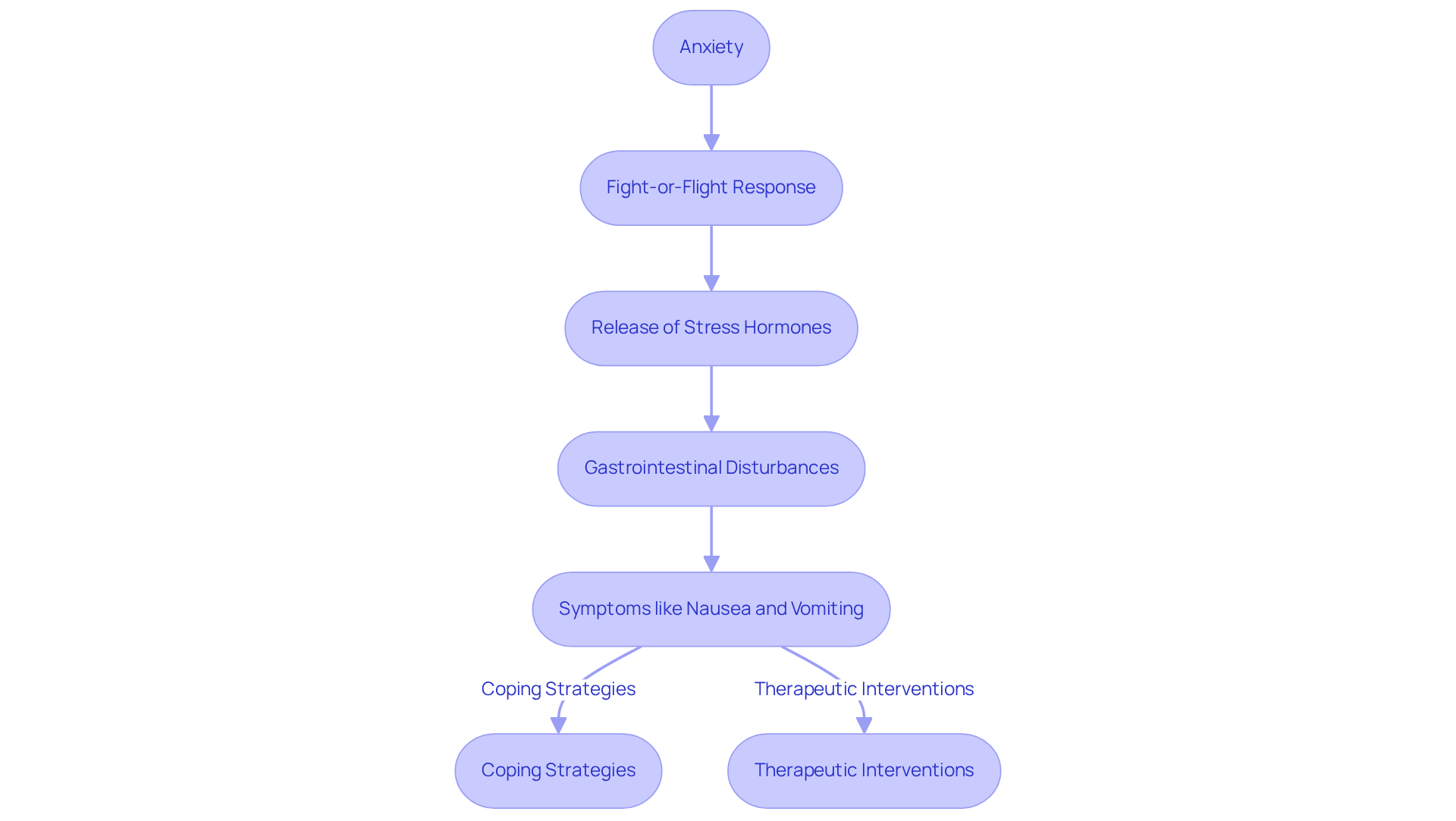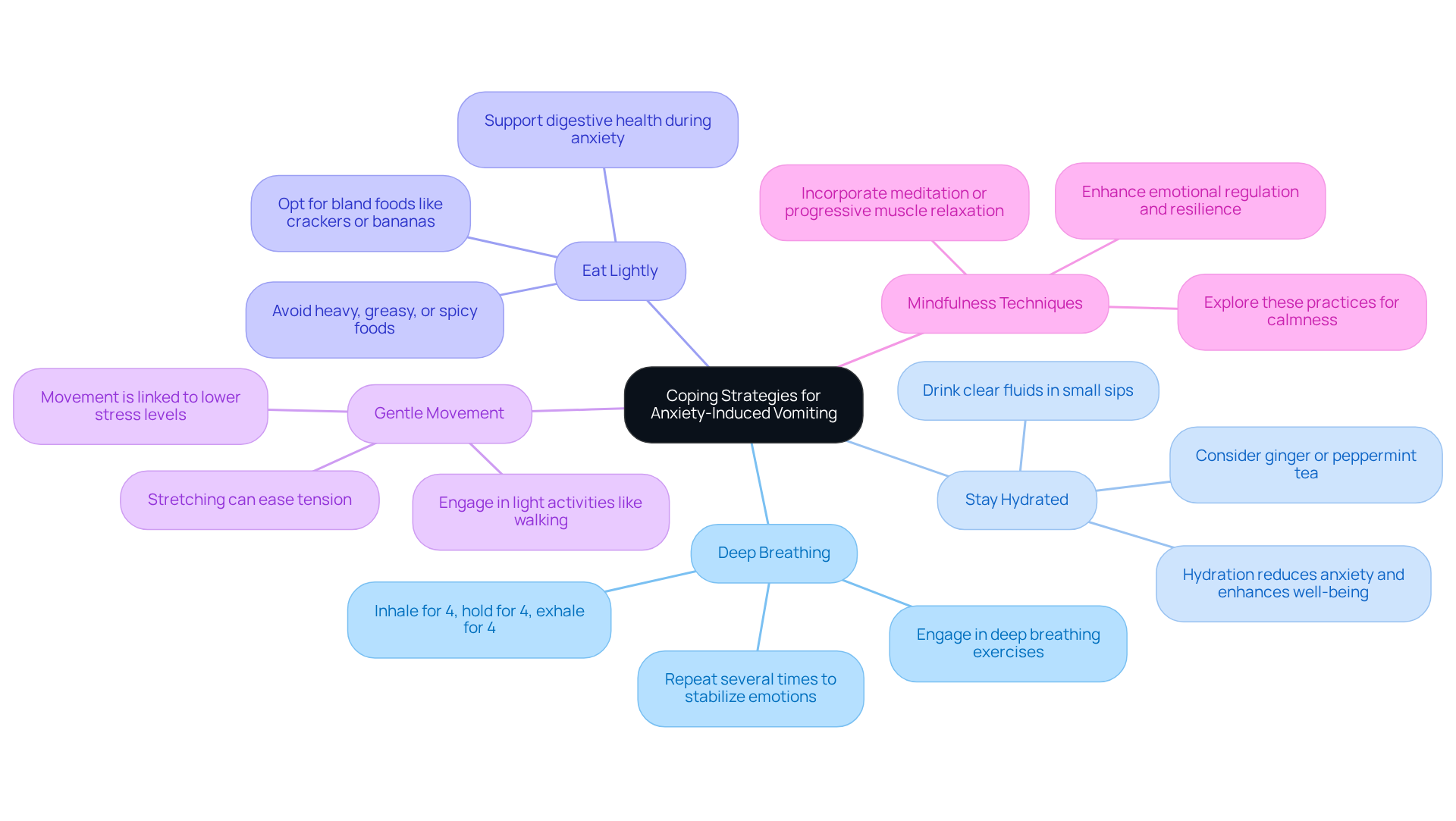Overview
To effectively manage the distress of throwing up from anxiety, it’s important to recognize the deep connection between anxiety and its physical symptoms. Have you ever felt overwhelmed by your body’s response to stress? Implementing coping strategies like deep breathing and mindfulness can be incredibly helpful. These techniques not only soothe the mind but also nurture your body, allowing you to regain control.
In addition to these self-care methods, seeking professional support when necessary is a vital step on your journey to healing. Understanding the physiological response to anxiety can empower you to address your symptoms. Remember, you are not alone in this; many have walked this path and found relief.
By embracing practical self-care techniques and being aware of when to reach out for help, you can significantly improve your overall well-being. It’s about taking those small yet meaningful steps towards a healthier you. Together, let’s explore these avenues of support and healing.
Introduction
Anxiety often manifests in unexpected ways, with physical symptoms such as nausea and vomiting frequently troubling those who grapple with stress-related disorders. Understanding the intricate connection between anxiety and these distressing bodily reactions is essential for individuals seeking relief.
Have you ever felt overwhelmed by the sensations that accompany anxiety? It’s important to recognize when these feelings become too much to bear and when it may be time to seek professional help.
This guide explores practical steps and coping strategies designed to empower you on your journey to reclaiming your well-being.
Understand the Connection Between Anxiety and Vomiting
Anxiety can provoke a range of physical reactions, particularly nausea, which can sometimes lead to , primarily due to the body's fight-or-flight response. This response activates the sympathetic nervous system, resulting in the release of stress hormones like adrenaline. These hormones can disrupt normal digestive functions, leading to feelings of nausea and, in some cases, sickness. Have you ever felt overwhelmed by these sensations? Studies show that a significant number of individuals with experiencing such issues, highlighting the prevalence of nausea among those affected. Research indicates that stress-related disorders often manifest with .
throwing up from anxiety. By recognizing that symptoms like throwing up from anxiety are a direct reaction to stress, individuals may feel less isolated and more empowered to confront their experiences. This awareness can pave the way for and therapeutic interventions, ultimately aiding in the management of stress and its physical manifestations.
At The Emerald Couch, we are dedicated to tailoring our therapy solutions to meet your unique needs, ensuring that you receive . Most clients begin to feel better or notice some improvement within 4 to 6 weeks of starting therapy, as we collaboratively set goals and determine when you feel you have achieved them. , such as meditation and mindful breathing, can significantly enhance your therapy experience by improving emotional regulation and self-awareness. These techniques allow you to slow down and create space between your thoughts and feelings, fostering a deeper understanding of your experiences.
Evidence-based interventions, such as , have proven effective in addressing anxiety-related disorders and their physical manifestations. It is also essential to recognize that many individuals with stress disorders may face concurrent conditions, which can complicate their challenges. By acknowledging these factors and integrating mindfulness into your daily routine, you can develop and seek appropriate therapeutic support. Remember, you are not alone on this journey; help is available, and healing is possible.

Implement Effective Coping Strategies for Anxiety-Induced Vomiting
To effectively manage , consider these nurturing strategies:
- : Have you ever felt the weight of anxiety pressing down on you? Engaging in can be a gentle way to calm your nervous system. Inhale deeply through your nose for a count of four, hold for four, and exhale through your mouth for a count of four. Research shows that this method can significantly reduce stress indicators, with a small-to-medium effect size of -0.32, suggesting that breathwork can ease feelings of unease. Repeat this several times to help stabilize your emotional state.
- Stay Hydrated: It's essential to take care of your body during stressful times. Drinking clear fluids in small sips can help prevent dehydration. Consider or peppermint tea, both of which can calm a troubled stomach. Remember, proper and enhancing your overall well-being.
- Eat Lightly: When nausea strikes, opting for bland foods such as crackers, toast, or bananas can be comforting. Steer clear of heavy, greasy, or spicy foods that may worsen your symptoms. can support your digestive system, allowing it to manage better during anxious moments.
- Engage in : Have you noticed how a simple walk can shift your mood? Light activities like walking or stretching can help ease tension and improve digestion. Movement is associated with lower stress levels, making it a beneficial practice during episodes of nausea.
- : Incorporating mindfulness practices such as meditation or progressive muscle relaxation can and promote a sense of calm. Therapists emphasize the importance of these techniques, noting they can enhance and resilience against symptoms, including throwing up from anxiety. As you explore these practices, remember that you are not alone on this journey.

Recognize When to Seek Professional Support
While self-management strategies can indeed be beneficial, it's essential to recognize when to seek professional support for . Have you ever felt overwhelmed by your symptoms? If so, consider reaching out for help if:
- : If you find yourself or experiencing nausea that continues despite your best coping efforts, it may signal the need for a professional evaluation.
- : When worry and its physical manifestations, including throwing up from anxiety, disrupt your ability to work, socialize, or perform daily tasks, is advisable.
- You Experience : Overwhelming feelings of anxiety or panic attacks warrant professional guidance to explore treatment options and coping mechanisms.
- : If you encounter concerning symptoms such as severe abdominal pain, dehydration, or significant weight loss, it is essential to promptly.
Understanding these signs can empower you to take proactive steps toward effectively. Remember, is a courageous step towards healing.

Conclusion
Understanding the intricate relationship between anxiety and its physical manifestations, such as vomiting, is crucial for effective management. Have you ever felt overwhelmed by your anxiety, perhaps even experiencing physical symptoms like nausea? By recognizing that throwing up from anxiety is a response to stress, individuals can feel more empowered to address their symptoms and seek appropriate support. This awareness lays the groundwork for implementing practical coping strategies that can alleviate the distress associated with anxiety-induced nausea.
The article outlines several key strategies for managing these symptoms, including:
- Deep breathing techniques
- Proper hydration
- Light eating
- Gentle movement
- Mindfulness practices
Each of these approaches not only targets the physical discomfort but also fosters emotional stability, reinforcing the idea that managing anxiety involves a holistic approach. In addition to this, knowing when to seek professional help is vital, especially when symptoms persist or significantly impact daily functioning.
Ultimately, the journey to managing anxiety-induced vomiting is one that requires both self-awareness and proactive measures. By embracing the suggested strategies and recognizing the importance of professional support when needed, individuals can take significant steps toward reclaiming their well-being. Healing is possible, and reaching out for help is not just a sign of strength but a vital part of the recovery process.
Frequently Asked Questions
How does anxiety lead to vomiting?
Anxiety can provoke nausea and vomiting due to the body's fight-or-flight response, which activates the sympathetic nervous system and releases stress hormones like adrenaline, disrupting normal digestive functions.
What is the significance of understanding the connection between anxiety and vomiting?
Recognizing that vomiting can be a reaction to anxiety helps individuals feel less isolated and more empowered to confront their experiences, paving the way for effective coping strategies and therapeutic interventions.
What role does therapy play in managing anxiety-related vomiting?
Therapy, particularly tailored approaches like cognitive-behavioral therapy (CBT), can help address anxiety-related disorders and their physical manifestations, with many clients noticing improvements within 4 to 6 weeks of starting therapy.
How can mindfulness practices help in managing anxiety?
Mindfulness practices, such as meditation and mindful breathing, enhance therapy experiences by improving emotional regulation and self-awareness, allowing individuals to create space between their thoughts and feelings.
What should individuals with stress-related disorders consider regarding their symptoms?
It's important to recognize that many individuals with stress disorders may face concurrent conditions that complicate their challenges, and integrating mindfulness into daily routines can help develop effective coping strategies.
Is help available for those experiencing anxiety-related vomiting?
Yes, help is available, and individuals are encouraged to seek appropriate therapeutic support to aid in their journey toward healing and wellness.




